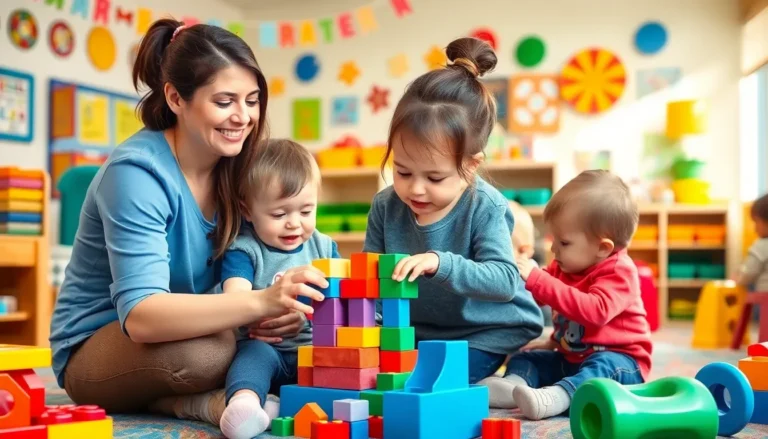Play isn’t just a way for kids to pass the time; it’s a crucial part of their development. Think of it as their version of a gym membership—only instead of lifting weights, they’re lifting their imaginations and social skills. From building castles in the sand to pretending to be superheroes, each type of play shapes a child’s future in ways that parents often overlook.
Dive into the delightful world of childhood play, where laughter meets learning. Understanding the four types of play can help parents and educators nurture well-rounded, confident kids. So grab your cape and join the adventure! Let’s explore how these playful antics lay the foundation for creativity, problem-solving, and social skills—all while keeping the fun alive.
Table of Contents
ToggleOverview Of Play In Child Development
Play plays a critical role in child development, serving as a foundation for learning and social interaction. Engaging in various types of play fosters cognitive, emotional, and physical growth. Understanding these types allows parents and educators to support children effectively.
Structured play, such as games with rules, develops critical thinking and strategic skills. Children learn to think ahead, make decisions, and work together with peers during these activities. Unstructured play, like free play, enhances creativity and self-expression. In unstructured formats, kids explore their interests, build friendships, and develop problem-solving abilities.
Social play encourages communication and cooperation. Children negotiate roles, share ideas, and resolve conflicts during this type of interaction. Meanwhile, solitary play provides an essential opportunity for self-discovery. Engaging alone enables children to explore their thoughts and feelings, which enhances their sense of identity.
All four types of play contribute uniquely to child development. Structured play shapes cognitive skills and teamwork. Unstructured play fuels creativity and imagination. Social play nurtures interpersonal skills and emotional understanding. Solitary play builds self-awareness and personal connections. Parents and educators benefit from recognizing the balance of these types while facilitating enriching play experiences.
The Importance Of Play

Play serves as a cornerstone in children’s development, influencing various aspects of their growth. Engaging in different types of play cultivates essential skills that shape a child’s future.
Cognitive Benefits
Cognitive development flourishes through play. Problem-solving skills improve as children navigate challenges during structured activities. Initiative and creativity emerge in unstructured play, where imagination guides actions. Memory and concentration strengthen when children follow rules in games. Experiences in role-playing foster critical thinking, allowing kids to visualize multiple perspectives. Each interaction or creative endeavor deepens understanding and promotes cognitive flexibility. Encouraging diverse play experiences cultivates a well-rounded intellect.
Social Benefits
Social skills gain enhancement through play. Collaborative games spark communication as children express ideas and negotiate roles. Friends form bonds during group activities, learning cooperation and empathy along the way. Observing social dynamics helps children understand cues, building emotional intelligence. During solitary play, children reflect on their interactions, which improves their future social engagements. Encouraging play enables kids to navigate relationships effectively and develop into capable, confident individuals.
The 4 Types Of Play
Understanding the four types of play enriches child development and supports various skills. Each type contributes uniquely to a child’s growth.
1. Functional Play
Functional play entails repetitive, simple actions designed to explore objects and their uses. It starts in infancy, with activities like shaking a rattle or stacking blocks. Such actions help children develop fine motor skills and an understanding of cause and effect. Engaging in functional play enhances cognitive abilities as children learn to manipulate their environment effectively. This type of play also sets the groundwork for more complex skills, making it essential during early development stages.
2. Constructive Play
Constructive play focuses on building or creating objects. Children often engage in this type of play by using blocks, play dough, or art supplies. As they experiment with various materials, kids enhance their critical thinking and problem-solving skills. Constructive play fosters creativity and imagination, as children envision and realize their ideas. Engaging in this play also strengthens spatial awareness as kids develop their understanding of structure and balance.
3. Dramatic Play
Dramatic play allows children to act out roles and scenarios. This often involves pretending to be a character from a story, playing house, or imitating adults. Participating in dramatic play fosters emotional intelligence, as kids explore different feelings and perspectives. This form of play also promotes language development and social skills through interaction with peers. As children express their thoughts and emotions, they build confidence and learn to navigate social situations.
4. Games With Rules
Games with rules involve structured activities that require following specific guidelines. These games, such as tag or board games, encourage children to practice cooperation and sportsmanship. Engaging in rule-based play enhances critical thinking and decision-making skills. This type of play teaches children the importance of strategy and understanding consequences. Following rules helps children develop patience and resilience while enjoying a sense of competition.
Supporting Play In Development
Creating effective play environments is essential for fostering all types of play. Safe outdoor spaces, stocked with age-appropriate toys, enable children to explore and engage. Indoor areas can feature versatile materials, like blocks or dress-up clothes, that stimulate creativity. Natural elements, such as sand or water, contribute to sensory experiences and encourage exploration. Design plays a significant role; organized, inviting settings inspire active participation in varied play.
Encouraging different types of play enhances a child’s overall development. Structured play, such as organized sports or games, can cultivate teamwork and discipline. Unstructured playtime, where children choose their activities, fosters creativity and independence. Facilitating social interactions through group play helps develop communication skills and collaboration. Rough-and-tumble play allows for physical activity while teaching boundaries and self-regulation. By providing opportunities for diverse play types, caregivers can support essential life skills and promote well-rounded growth.
Conclusion
Understanding the four types of play is essential for nurturing children’s development. Each type—structured, unstructured, social, and solitary—offers unique benefits that contribute to a child’s cognitive, emotional, and physical growth. By recognizing the importance of these diverse play experiences, parents and educators can create enriching environments that foster creativity, critical thinking, and social skills.
Encouraging a balance of play types not only supports children’s overall development but also helps them navigate relationships and build confidence. Investing in play is investing in a child’s future, ensuring they grow into capable and well-rounded individuals.



